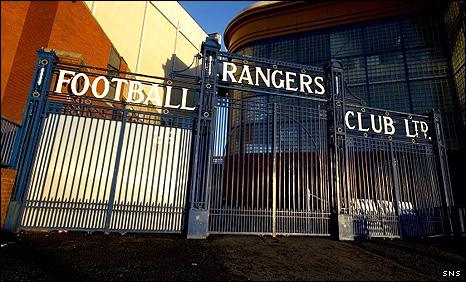Rangers chairman admits club could go out of business
- Published

Rangers have suffered a period of financial problems
Rangers chairman Alastair Johnston has admitted that the club could go bust.
The admission came in the wake of recent talks with would-be owner Craig Whyte and half-yearly figures indicating that the club owes £29m.
Johnston insists that, when published in June, annual figures will show that debts have dropped to around £22m.
But he nodded in agreement when asked if it was possible for the club to go out of business if a decision over tax payments went heavily against them.
"The reality is that, if the decision is bad and the club can't pay, there would be a decision to be made," said Johnston, who expects a decision on the purchase of the club in the next couple of days.
"It's not clear where the liability lies. It could be October or November before we find out.
"The situation is not holding up the sale, but it does inhibit new financing and new investment.
"I have no idea of the sum for which we may be liable, but Rangers cannot afford much."
However, Rangers have since released a statment to say: "Further to some press comment today following the release of our Interim Results, we would like to clarify that our chairman did not state that the club could go out of business.
"Moreover, we would refer interested parties to the section in the Interim Results (paragraph 7) that covers the current position with the HMRC enquiry and importantly to the fact that the Club continues to vigorously contest HMRC's challenge and in doing so continues to receive reassuring opinion from tax, accounting and legal specialists.
"The directors of The Rangers Football Club plc accept responsibility for this announcement."
Figures for the six months to 31 December show that the amount Rangers owe to creditors due within the next year has increased by nearly £3.5m to £29m, most of that is believed to be owed to Lloyds Banking Group.
The club suffered a drop in pre-tax profit from £13m to £9m, turnover decreased by £4.1m to £33.7m and there was also a 4.9% decline in the number of season tickets sold, together with a reduction in sponsorship income.
However, Johnston insists that annual figures will show that finances are now in a much healthier state.
"Today's figures are a snapshot," he said. "They are not bad figures.
"Progress is good. Around £22m is a more realistic debt figure."
The real concern for Rangers is the judement they await from Her Majesty's Revenue and Customs over a tax issue relating to offshore payments to players and the Murray Group Management Limited Remuneration Trust.
Johnston admitted that "but for the HMRC verdict, life would be a lot easier" and he acknowledged in his statement to the Stock Exchange the investigation relating to offshore payments to players and the Murray Group Management Limited Remuneration Trust.
"I would emphasise that no allegations have been made to suggest any illegal activity and tax vehicles of this type have been used by a number of companies throughout the country," he said.
"We continue to vigorously contest HMRC's challenge on the taxation treatment of the trust and, in doing so, continue to receive reassuring opinion from tax, accounting and legal specialists."
The club's financial position has also been hit by a separate charge from the HMRC for £2.8m for activities in a player compensation scheme between 1999 and 2003.
All this is happening as Rangers are deep in talks with Whyte, who is hoping to take over ownership from Sir David Murray.
"This is a two-way street," said Johnston. "He is still enthusiastically addressing the issue and we are looking at his credentials.
"I want a forcing mechanism to force him to do what he says he is going to do in terms of future investment in the club.
"His agreement with the bank and with David Murray has nothing to do with Rangers. I want assurances of his ability to fund what he says he is going to do.
"Craig has to understand the club's position and the expectation level of the fans.
"It is very easy to talk about £25m investment, but there must be a forcing mechanism.
"We must get it into any purchase agreement. I admit this is very unusual."
Johnston also revealed that he asked manager Walter Smith and chief executive Martin Bain to give Whyte a briefing about the cash flow of the club in terms of the future requirement of players and that was done last week.
Rangers' chairman had criticised the club's banker in his statement to the Stock Exchange for making Smith's job more difficult than necessary.
"While we appreciate the support of the Lloyds Banking Group through the Bank of Scotland in extending our credit arrangement and recognising the progress that has been made in developing a template for collaboration, certain provisions imposed on the club continue to compromise, in our opinion, management's ability to conduct its role with maximum efficiency," Johnston said in his statement.
Indeed, despite Smith being restricted in his movements in the transfer market, player costs have remained around the same thanks to the addition of Nikica Jelavic, Vladimir Weiss and James Beattie.
The latest figures also show that Rangers' gained more from the sale of Danny Wilson to Liverpool and Kevin Thomson to Middlesbrough than they did the previous year for Barry Ferguson to Birmingham City and Charlie Adam to Blackpool.
"Net operating expenses at £21.1m are in line with last year, with base salary costs at similar levels and reduced matchday costs offset by higher maintenance expenditure and provisions for doubtful debts," explained Johnston.
- Published1 April 2011